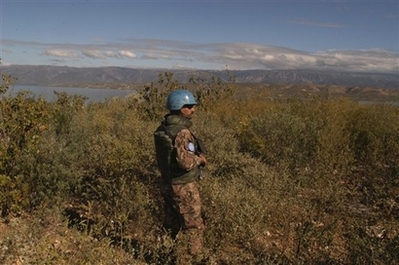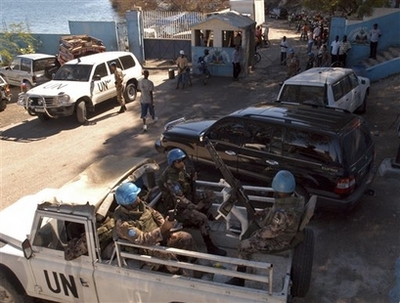| @wehaitians.com | |
No one writes to the tyrants | |
HistoryHeads/Not Just Fade Away |
| Correspond with us, including our executive editor, professor Yves A. Isidor, via electronic mail: |
| letters@wehaitians.com; by way of a telephone: 617-852-7672. |
| Want to send this page or a link to a friend? Click on mail at the top of this window. |
|
 |
|
| Posted Sunday, January 6, 2007 |
| To also prevent exchange of drugs, arms, Haiti UN occupation forces construct four bases along the Haitian-Dominican border |
| By The Associated Press |
MALPASSE, Haiti - After nearly four years working to stabilize Haiti's government, U.N. peacekeepers in this struggling country are shifting their focus to the border and cracking down on smuggling and human trafficking, the international mission chief said Saturday.
 |
| A U.N. peacekeeping soldier from Jordan stands in a brushy area outside the town of Malpasse, Haiti, near the border with the Dominican Republic, Saturday, Jan. 5, 2008. U.N. peacekeeping troops are building fortifications along Haiti's border to crack down on rampant smuggling and human trafficking, the chief of the international mission said Saturday.(AP Photo/Evens Sanon) |
Observation points and bases are being built along the Haitian-Dominican border to deter illegal crossers and prevent the exchange of drugs and arms, U.N. envoy Hedi Annabi said.
He visited the 255-mile border on Saturday, stopping at a future U.N.-run operations base near the main commercial crossing point of Malpasse, the closest entry point to the Haitian capital.
"Everybody knows the border is out of control. We don't have the resources or infrastructure to manage it," Haiti's customs chief Jean-Jacques Valentin said while touring the area with the U.N. delegation.
Since being deployed after a February 2004 uprising that ousted former President Jean-Bertrand Aristide, the 7,800-strong U.N. force has helped rebuild Haiti's government and suppressed violent gangs in the capital. Now, about 120 soldiers will be stationed at four bases along the porous border.
Three have been completed. The fourth, planned for Malpasse, will be finished in a month, Annabi said. A Jordanian platoon will use it to coordinate operations and monitor the brush-covered mountains and saltwater Lake Azuei, which is popular with smugglers.
From the planned base, "you can control the breadth of the lake and make sure nobody is coming across that shouldn't be coming across, and you can also control the road," Annabi told The Associated Press. Haitian authorities will take over the bases when the U.N. mission ends.
 |
| U.N. peacekeeping soldiers from Jordan wait in the back of a truck in the town of Malpasse, Haiti, on the border with the Dominican Republic, Saturday, Jan. 5, 2008. U.N. peacekeeping troops are building fortifications along Haiti's border to crack down on rampant smuggling and human trafficking, the chief of the international mission said Saturday.(AP Photo/Evens Sanon) |
Dionisio Javier, customs chief in the neighboring Dominican border town of Jimani, said the increased U.N. presence is welcome.
"In terms of Dominican-Haitian relations, we understand that the U.N. improves things," he said.
Enforcement problems along the remote Caribbean border are as vast as the arid countryside that surrounds it.
Hundreds of thousands of Haitians cross illegally each year, many of them seeking low-wage jobs on Dominican sugar plantations and construction sites. Migrants complain of abuses by Dominican guards, including a new 1,000-member force that received training and equipment from the U.S. government.
Anelia Fortine, a 27-year-old Haitian who sells fruit on the Dominican side, said she is often shaken down for money.
"If you don't have enough, they take what is in your purse garlic, beans, whatever," she said.
Other migrants accuse guards of watching idly as gangs rob them, but Dominican officials deny that such practices are widespread.
RELATED TEXT: When Haiti national police chief, Andresol, does not trust of his police officers
| Wehaitians.com, the scholarly journal of democracy and human rights |
| More from wehaitians.com |